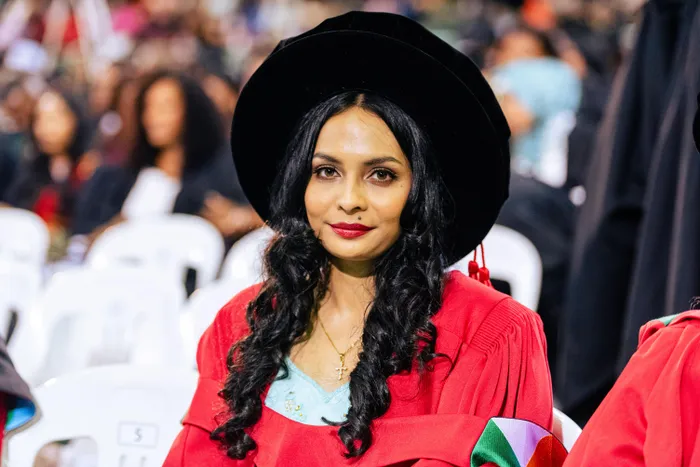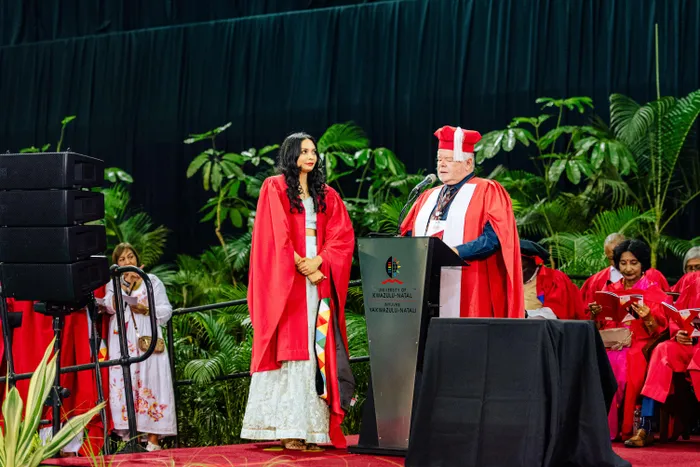South African young scientist Kimberleigh Govender selected for prestigious Lindau Nobel Laureate Meeting

Kimberleigh Govender has been recognised as one the South Africa's leading young scientists. She will represent the country at the 74th Lindau Nobel Laureate Meeting in Germany, next week.
Image: Supplied
AN OPPORTUNITY to pick the brains of a group of Nobel laureates who are some of the world’s most outstanding scientific minds is what awaits Kimberleigh Govender of Chatsworth.
Govender, 31, was counted among seven exceptional young scientists in South Africa and chosen to represent the country at the 74th Lindau Nobel Laureate Meeting, in Germany, next week.
The Academy of Science of South Africa (ASSAf) was responsible for selecting candidates for the German opportunity focused on chemistry, where more than 30 laureates are expected to attend.
The ASSAf, which has backing from the Department of Science, Technology and Innovation, is an official partner of the Lindau Foundation.
Representatives from 84 countries are expected to be in attendance at the meeting that runs from June 29 to July 4.
“I feel incredibly blessed, honoured and grateful to have been chosen by the ASSAf. Their recognition is a reminder that hard work and dedication pays off,” said Govender.
She currently works as an ad-hoc University of KwaZulu-Natal lecturer in organic chemistry and is a post-doctoral researcher in their catalysis and peptide unit
Govender recently graduated with a PhD in Pharmaceutical Chemistry.

Kimberleigh Govender Govender recently graduated with a PhD in Pharmaceutical Chemistry at the University of KwaZulu-Natal
Image: Supplied
She is presently expanding on the research she completed during her PhD, at UKZN.
Previously Govender acquired a Master's degree in Pharmaceutical Chemistry, BSc Honours in Chemistry and a BSc in Applied Chemistry, all of which were attained summa cum laude (achieved with the highest distinction).
With a string of qualifications to her name already, Govender believes there is no end to learning for academics like herself.
“That is what makes being an academic interesting and exciting. Science is ever changing with constant discoveries being made, and academics must continue to learn to keep up and ensure meaningful contributions are constantly achieved.
“I believe that lifelong learning is what makes us human - it doesn't only apply to academics.”
Therefore, she is brimming with excitement ahead of the Laureate Meeting.
“It is a once-in-a-lifetime opportunity where young scientists are allowed to directly engage with past Nobel Prize winners. It's like meeting your greatest role model .
“This trip will provide me with an incredible opportunity to grow both scientifically and professionally. I will be exposed to cutting-edge ideas, global perspectives and emerging trends in my field.”
Govender regards the German venture as one of her greatest achievements thus far and regards highly the networking platform it will create for her
She said she was eager to hear from the eminent speakers how they overcame their research challenges and where they see their specific field heading, especially in terms of sustainability.
“I am excited to meet and engage with the most brilliant and pioneering minds in the field of chemistry. They are esteemed professors and innovators in the field, whose groundbreaking contributions have not only transformed modern science but also led to real-world applications that benefit society as a whole.”
Govender is most keen to meet the 2021 Nobel Prize winners in Chemistry, Professor Benjamin List and David MacMillan.
“They were awarded for their pioneering work in Asymmetric Organocatalysis - a field which has been instrumental in my Master's and PhD research. I want to know more about their current research and their opinion on where they see the field of organocatalysis heading to.”
From a young age, Govender was always curious about "why things were the way they were".
She enjoyed problem solving and had the desire to help people, this stirred her interest in forensic science.
When she began her career in chemistry, it was with the intention to venture into forensics, but along the way she “fell in love with the creativity and applicability of organic chemistry”.
“I found that I could help people by applying my creative side to pharmaceutical chemistry, and researching new medications.
Her current research involves developing methods to access medicines, for example tuberculosis, in an environmentally friendly way.
“I aim to find better treatments while also reducing the harm that drug production can cause to the planet.”
She has regard for the value that AI has added to science but is always mindful to verify the information it churned out.
Govender said one of her immediate goals was to complete an international postdoctoral fellowship in a prestigious laboratory, before returning to continue lecturing and her research work.
She appreciated her parents (Dan and Marilyn), who were “extremely proud of everything I have achieved”.
”I am so grateful for their tremendous support, sacrifice and love through all my years of study.”
DAILY NEWS